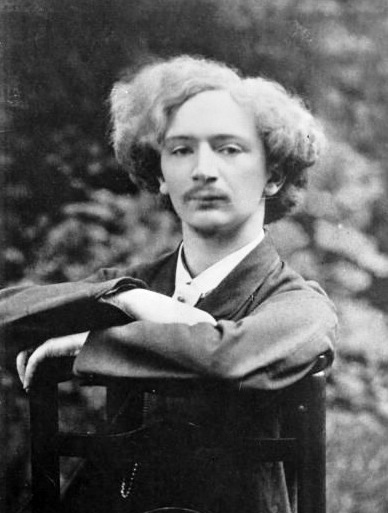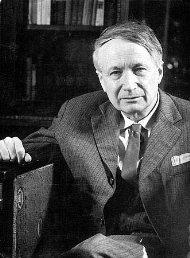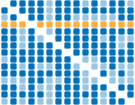Swinburne, Charles Algernon: Ha rója kopókkal (When the hounds of spring in Hungarian)
|
When the hounds of spring (English)Chorus from 'Atalanta'
When the hounds of spring are on winter's traces, The mother of months in meadow or plain Fills the shadows and windy places With lisp of leaves and ripple of rain; And the brown bright nightingale amorous Is half assuaged for Itylus, For the Thracian ships and the foreign faces. The tongueless vigil, and all the pain.
Come with bows bent and with emptying of quivers, Maiden most perfect, lady of light, With a noise of winds and many rivers, With a clamour of waters, and with might; Bind on thy sandals, O thou most fleet, Over the splendour and speed of thy feet; For the faint east quickens, the wan west shivers, Round the feet of the day and the feet of the night.
Where shall we find her, how shall we sing to her, Fold our hands round her knees, and cling? O that man's heart were as fire and could spring to her, Fire, or the strength of the streams that spring! For the stars and the winds are unto her As raiment, as songs of the harp-player; For the risen stars and the fallen cling to her, And the southwest-wind and the west-wind sing.
For winter's rains and ruins are over, And all the season of snows and sins; The days dividing lover and lover, The light that loses, the night that wins; And time remember'd is grief forgotten, And frosts are slain and flowers begotten, And in green underwood and cover Blossom by blossom the spring begins.
The full streams feed on flower of rushes, Ripe grasses trammel a travelling foot, The faint fresh flame of the young year flushes From leaf to flower and flower to fruit; And fruit and leaf are as gold and fire, And the oat is heard above the lyre, And the hoofed heel of a satyr crushes The chestnut-husk at the chestnut-root.
And Pan by noon and Bacchus by night, Fleeter of foot than the fleet-foot kid, Follows with dancing and fills with delight The Maenad and the Bassarid; And soft as lips that laugh and hide The laughing leaves of the trees divide, And screen from seeing and leave in sight The god pursuing, the maiden hid.
The ivy falls with the Bacchanal's hair Over her eyebrows hiding her eyes; The wild vine slipping down leaves bare Her bright breast shortening into sighs; The wild vine slips with the weight of its leaves, But the berried ivy catches and cleaves To the limbs that glitter, the feet that scare The wolf that follows, the fawn that flies.
|
Ha rója kopókkal (Hungarian)Kardal az Atalanté Kalüdónban c. tragédiából
Ha rója kopókkal a téli csapást a tavasz, s holdfényben a táj, esőkopogást és lombsusogást szív be a szellő-járta homály; már érzi a barna fülemüle, hogy jobb Itüloszt felednie, a trák hajósokat és a gyászt, a néma virrasztást s mind, ami fáj.
Jöjj, ajzd fel az íjat, ürítsd tegezed, fény hölgye, te szűz szeplőtelenül, jöjj el hatalommal, végy szeleket s zúgó vizeket kíséretedül; ó, legsebesebb, sarupánttal kösd ragyogó lábadat által, mert kelet éled, s nyugat ott remeg sápadtan az éj s nap lába körül.
Hol leljük, a dal hogyan érheti el, térdét hogy öleljük át? Bár lenne szívünk, mint láng, ha szökell, mint ár, mikor omlik a gát! Mert köntöse csillagi fények, s a szél neki hárfaének, kit a hajnal s alkonyi csillag ölel, s Zefürosznak hallja dalát.
Mert múlik a tél, az esők, hidegek, a havak meg a bűnök évszaka, mely elkülönít szerető szíveket; fut a fényt elölő éjszaka; fölidézve legott feledjük a rosszat, megtörve a fagy, bimbók fakadoznak, és kél a bozótban s zöld ligetek virágai közt a tavasz maga.
Kákát fal az áradó patak, bukdácsol a fűben a láb, a fiatal év üde lángja csap lombról a virágra, gyümölcsre át; parázslik a lomb s a gyümölcs is aranylón, áthallik a nádsíp hangja a lantszón, s a gesztenyefák terebélye alatt a gyesztenyehéjra szatírpata hág.
Délben Pán s Bakkhosz éjszaka táncol, túltéve a kecskebakon, s ha nyomukban jár, átfut a mámor a bakkhánsnőn s a menádokon; s mintha szelíd ajk mosolyogna, szétválik nevetőn a fa lombja, takarja az ösvényt s fölfedi máskor, hol az isten elől a leány eloson.
Repkénnyel a bakkhánsnő haja, lehullva, szemét takarja el; lecsúszik a vadszőlő, s csupasz a sóhajba feszült, ragyogó kebel; lecsúszik a vadszőlő, a nehézkes, de csügg a bogyós repkény ama fényes tagokon; ha dübög lábak dobaja, fut az őz, nem jön farkas se közel.
|





